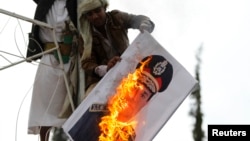Facing fierce pressure from Islamists, Egypt's top general on Sunday said the decision to remove Islamist Mohamed Morsi from the presidency was made in response to what he called the will of the people.
General Abdel-Fattah el-Sisi spoke Sunday on national television, for the first time since Morsi's July 3 ouster. He said Morsi, Egypt's first democratically elected president, had lost legitimacy because of mass protests by his opponents. But he rejected accusations the removal was religiously motivated.
Morsi has been held at an undisclosed location since his removal, while scores of senior members of his Muslim Brotherhood Party have been taken into custody. Authorities have not charged him with a crime, but say they are investigating a series of complaints against him including spying and wrecking the economy.
The Brotherhood urged its supporters to gather peacefully in Cairo on Monday for the latest in a series of mass protests against the Morsi ouster. Thousands have been rallying for days near a mosque in northeast Cairo to demand the former president's reinstatement.
In related developments, interim leaders on Sunday swore in prominent liberal Mohamed ElBaradei as vice president and offered the post of foreign minister to a former Egyptian ambassador to the United States.
More ministerial positions are expected to be confirmed in the coming days.
ElBaradei, a Nobel laureate and former head of the U.N. nuclear agency, led a huge opposition coalition in the protests that prompted Morsi's removal. Details of his new role were not immediately clear.
In another move Sunday, Egyptian judicial sources said the public prosecutor ordered the freezing of assets of 14 prominent Islamists, including Brotherhood supreme leader Mohamed Badie.
U.S. Deputy Secretary of State Bill Burns is meeting with authorities in Cairo from Sunday to Tuesday in the first visit by a high-ranking U.S. official since Morsi's removal. The State Department said Burns will "underscore U.S. support for the Egyptian people, an end to all violence, and a transition leading to an inclusive, democratically elected civilian government."
Washington also has called on Egypt's interim leadership to avoid a politically motivated crackdown on the deposed president and his supporters.
Some information for this report was provided by AP, AFP and Reuters.
General Abdel-Fattah el-Sisi spoke Sunday on national television, for the first time since Morsi's July 3 ouster. He said Morsi, Egypt's first democratically elected president, had lost legitimacy because of mass protests by his opponents. But he rejected accusations the removal was religiously motivated.
Morsi has been held at an undisclosed location since his removal, while scores of senior members of his Muslim Brotherhood Party have been taken into custody. Authorities have not charged him with a crime, but say they are investigating a series of complaints against him including spying and wrecking the economy.
The Brotherhood urged its supporters to gather peacefully in Cairo on Monday for the latest in a series of mass protests against the Morsi ouster. Thousands have been rallying for days near a mosque in northeast Cairo to demand the former president's reinstatement.
In related developments, interim leaders on Sunday swore in prominent liberal Mohamed ElBaradei as vice president and offered the post of foreign minister to a former Egyptian ambassador to the United States.
More ministerial positions are expected to be confirmed in the coming days.
ElBaradei, a Nobel laureate and former head of the U.N. nuclear agency, led a huge opposition coalition in the protests that prompted Morsi's removal. Details of his new role were not immediately clear.
In another move Sunday, Egyptian judicial sources said the public prosecutor ordered the freezing of assets of 14 prominent Islamists, including Brotherhood supreme leader Mohamed Badie.
U.S. Deputy Secretary of State Bill Burns is meeting with authorities in Cairo from Sunday to Tuesday in the first visit by a high-ranking U.S. official since Morsi's removal. The State Department said Burns will "underscore U.S. support for the Egyptian people, an end to all violence, and a transition leading to an inclusive, democratically elected civilian government."
Washington also has called on Egypt's interim leadership to avoid a politically motivated crackdown on the deposed president and his supporters.
Some information for this report was provided by AP, AFP and Reuters.






